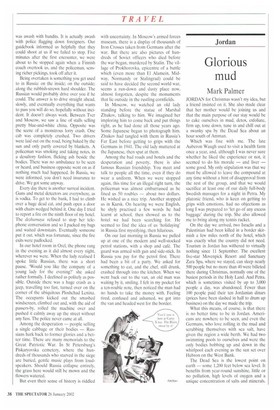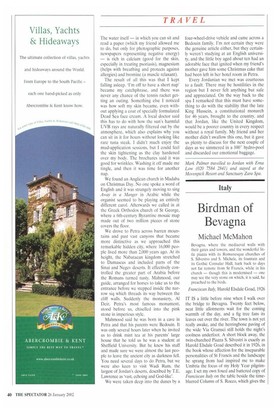Glorious mud
Mark Palmer
JORDAN for Christmas wasn't my idea, but a friend insisted on it. She also made clear that her mother would be joining us and that the main purpose of our stay would be to cake ourselves in mud, detox, exfoliate, firm up, tone down, tune in and chill out at a swanky spa by the Dead Sea about an hour south of Amman.
Which was fine with me. The late Auberon Waugh used to visit a health farm once a year, and, although I was never sure whether he liked the experience or not, it seemed to do his morale — and liver — some good. My only stipulation was that we must be allowed to leave the compound at any time without a hint of disapproval from the rest of the group, and that we would sacrifice at least one of our daily full-body Swedish massages for a night in Petra. My platonic friend, who is keen on getting to grips with emotions, had no objections as long [was prepared to let go of any excess baggage' during the trip. She also allowed me to bring along my tennis racket.
On the day we arrived, two Israelis and a Palestinian had been killed in a border skirmish a few miles north of the hotel, which was exactly what the country did not need. Tourism in Jordan has withered to virtually nothing since 11 September. The excellent five-star Movenpick Resort and Sanctuary Zara Spa, where we stayed, can sleep nearly 500 people but no more than 40 were billeted there during Christmas, normally one of the busiest periods in the Holy Land. And Petra, which is sometimes visited by up to 3,000 people a day, was abandoned. Fewer than 100 people paid their ten Jordanian dinars (prices have been slashed in half to drum up business) on the day we made the trip.
What this means, of course, is that there is no better time to be in Jordan. Americans are nowhere to be seen, and even the Germans, who love rolling in the mud and scrubbing themselves with sea salt, have given the region a wide berth. We had two swimming pools to ourselves and were the only bodies bobbing up and down in the whirlpool each evening as the sun set over Hebron on the West Bank.
The Dead Sea is the lowest point on earth — some 1,200 feet below sea level. It benefits from year-round sunshine, little or no pollution, high levels of oxygen and a unique concentration of salts and minerals.
The water itself — in which you can sit and read a paper (which my friend allowed me to do, but only for photographic purposes, newspapers representing negative energy) — is rich in calcium (good for the skin, especially in treating psoriasis), magnesium (helps with breathing and protects against allergies) and bromine (a muscle relaxant).
The result of all this was that I kept falling asleep. 'I'm off to have a short nap' became my catchphrase, and there was never any chance of the tennis racket getting an outing. Something else I noticed was how soft my skin became, even without applying a coat of specially formulated Dead Sea face cream. A local doctor said this has to do with how the sun's harmful UVB rays are naturally filtered out by the atmosphere, which also explains why you can sit in it for hours without looking like rare tuna steak. I didn't much enjoy the mud-application sessions, but I could feel the skin tightening as the clay hardened over my body. The brochures said it was good for wrinkles. Washing it off made me tingle, and then it was time for another nap.
We found an Anglican church in Madaba on Christmas Day. No one spoke a word of English and it was strangely moving to sing Away in a Manger in Arabic while the organist seemed to be playing an entirely different carol. Afterwards we called in at the Greek Orthodox church of St George, where a 6th-century Byzantine mosaic map made out of two million pieces of stone covers the floor.
We drove to Petra across barren mountains and past vast canyons that became more distinctive as we approached this remarkable hidden city, where 16,000 people lived more than 2,000 years ago. At its height, the Nabataean kingdom stretched to Damascus and included parts of the Sinai and Negev deserts. It effectively controlled the greater part of Arabia before the Romans turned nasty. Mahmood, our guide, arranged for horses to take us to the entrance before we stepped inside the narrow siq which threads its way between the cliff walls. Suddenly the monastery, Al Deir, Petra's most famous monument, stood before us, chiselled into the pink stone in imperious style.
Mahmood said he was born in a cave in Petra and that his parents were Bedouin. It was only several hours later when he invited us to drink mint tea at his parents' large house that he told us he was a student at Sheffield University. But he knew his stuff and made sure we were almost the last people to leave the ancient city as darkness fell. You need several days to do Petra, but we were also keen to visit Wadi Rum, the largest of Jordan's deserts, described by T.E. Lawrence as vast, echoing and God-like'.
We were taken deep into the dunes by a four-wheel-drive vehicle and came across a Bedouin family. I'm not certain they were the genuine article either, but they certainly weren't studying at an English university, and the little boy aged about ten had an adorable face that ignited when my friend's mother gave him some Christmas cake that had been left in her hotel room in Petra.
Every Jordanian we met was courteous to a fault, There may be hostilities in the region but I never felt anything but safe and appreciated. On the way back to the spa I remarked that this must have something to do with the stability that the late King Hussein, a constitutional monarch for 46 years, brought to the country, and that Jordan, like the United Kingdom, would be a poorer country in every respect without a royal family. My friend and her mother didn't swallow this one, but it gave us plenty to discuss for the next couple of days as we simmered in a 100° hydro-pool and discarded our emotional baggage.
Mark Palmer travelled to Jordan with Erna Low (020 7584 2841) and stayed at the Movenpick Resort and Sanctuary Zara Spa.



















































































 Previous page
Previous page